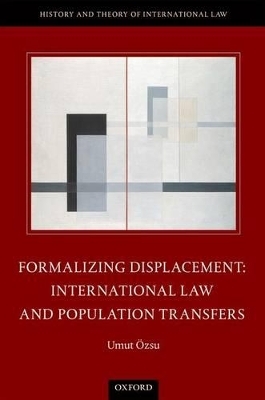
Formalizing Displacement
International Law and Population Transfers
Seiten
2014
Oxford University Press (Verlag)
978-0-19-871743-0 (ISBN)
Oxford University Press (Verlag)
978-0-19-871743-0 (ISBN)
The 1922-34 exchange of minorities between Greece and Turkey was the first legally mandated compulsory population movement of its scale and sophistication. The book will demonstrate how such population movements were justified at the time as a radical version of minority protection, and how it impacted on ideas of ethnic nation-building.
Large-scale population transfers are immensely disruptive. Interestingly, though, their legal status has shifted considerably over time. In this book, Umut Özsu situates population transfer within the broader history of international law by examining its emergence as a legally formalized mechanism of nation-building in the early twentieth century. The book's principal focus is the 1922-34 compulsory exchange of minorities between Greece and Turkey, a crucially important endeavour whose legal dimensions remain under-scrutinized. Drawing upon historical sociology and economic history in addition to positive international law, the book interrogates received assumptions about international law's history by exploring the 'semi-peripheral' context within which legally formalized population transfers came to arise.
Supported by the League of Nations, the 1922-34 population exchange reconfigured the demographic composition of Greece and Turkey with the aim of stabilizing a region that was regarded neither as European nor as non-European. The scope and ambition of the undertaking was staggering: over one million were expelled from Turkey, and over a quarter of a million were expelled from Greece. The book begins by assessing minority protection's development into an instrument of intra-European governance during the course of the nineteenth and early twentieth centuries. It then shows how population transfer emerged in the 1910s and 1920s as a radical alternative to minority protection in Anatolia and the Balkans, focusing in particular on the 1922-3 Conference of Lausanne, at which a peace settlement formalizing the compulsory Greek-Turkish exchange was concluded. Finally, it analyses the Permanent Court of International Justice's 1925 advisory opinion in Exchange of Greek and Turkish Populations, contextualizing it in the wide-ranging debates concerning humanitarianism and internationalism that pervaded much of the exchange process.
Large-scale population transfers are immensely disruptive. Interestingly, though, their legal status has shifted considerably over time. In this book, Umut Özsu situates population transfer within the broader history of international law by examining its emergence as a legally formalized mechanism of nation-building in the early twentieth century. The book's principal focus is the 1922-34 compulsory exchange of minorities between Greece and Turkey, a crucially important endeavour whose legal dimensions remain under-scrutinized. Drawing upon historical sociology and economic history in addition to positive international law, the book interrogates received assumptions about international law's history by exploring the 'semi-peripheral' context within which legally formalized population transfers came to arise.
Supported by the League of Nations, the 1922-34 population exchange reconfigured the demographic composition of Greece and Turkey with the aim of stabilizing a region that was regarded neither as European nor as non-European. The scope and ambition of the undertaking was staggering: over one million were expelled from Turkey, and over a quarter of a million were expelled from Greece. The book begins by assessing minority protection's development into an instrument of intra-European governance during the course of the nineteenth and early twentieth centuries. It then shows how population transfer emerged in the 1910s and 1920s as a radical alternative to minority protection in Anatolia and the Balkans, focusing in particular on the 1922-3 Conference of Lausanne, at which a peace settlement formalizing the compulsory Greek-Turkish exchange was concluded. Finally, it analyses the Permanent Court of International Justice's 1925 advisory opinion in Exchange of Greek and Turkish Populations, contextualizing it in the wide-ranging debates concerning humanitarianism and internationalism that pervaded much of the exchange process.
Umut Özsu is an Assistant Professor of Law at the University of Manitoba. His research interests lie principally in public international law, the history and theory of international law, and socio-legal studies.
Introduction ; 1. The Ottoman Empire and the International Law of Minority Protection, 1815-1923 ; 2. Early Experiments in Population Transfer, 1913-9 ; 3. 'A Subject Which Excites the Deepest Interest Throughout the Civilised World': Legal Diplomacy at the Conference of Lausanne ; 4. Humanitarianism, the World Court, and the Relation between Domestic and International Law ; Conclusion
| Reihe/Serie | The History and Theory of International Law |
|---|---|
| Verlagsort | Oxford |
| Sprache | englisch |
| Maße | 162 x 241 mm |
| Gewicht | 444 g |
| Themenwelt | Geisteswissenschaften ► Geschichte ► Regional- / Ländergeschichte |
| Geschichte ► Teilgebiete der Geschichte ► Militärgeschichte | |
| Recht / Steuern ► EU / Internationales Recht | |
| Recht / Steuern ► Öffentliches Recht ► Völkerrecht | |
| Recht / Steuern ► Rechtsgeschichte | |
| ISBN-10 | 0-19-871743-1 / 0198717431 |
| ISBN-13 | 978-0-19-871743-0 / 9780198717430 |
| Zustand | Neuware |
| Haben Sie eine Frage zum Produkt? |
Mehr entdecken
aus dem Bereich
aus dem Bereich
neueste Manipulationstechniken als Waffengattung der NATO
Buch | Softcover (2023)
Westend (Verlag)
24,00 €
Deutschlands Schwäche in der Zeitenwende
Buch | Softcover (2023)
C.H.Beck (Verlag)
18,00 €


